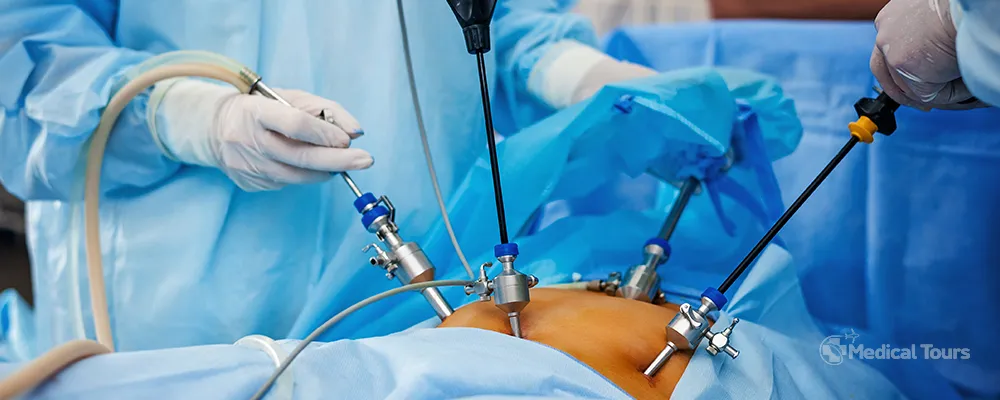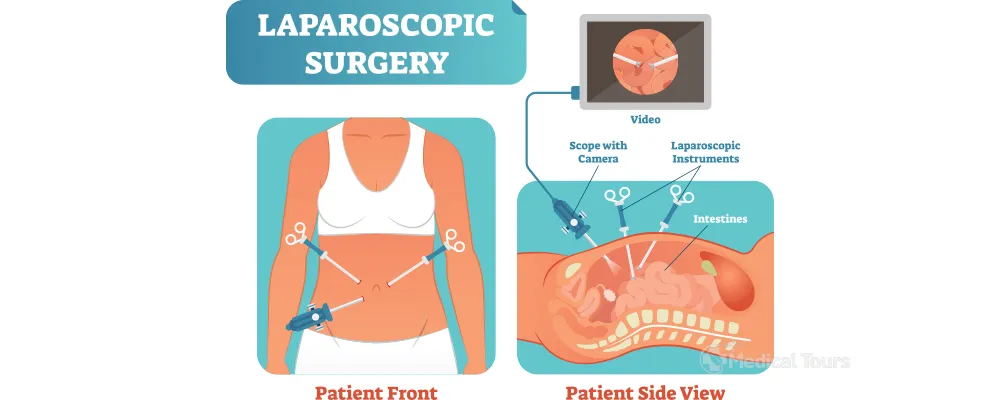Laparoscopic surgery is also known by the name of minimally invasive surgery or by the name of keyhole surgery. There are numerous operations that can be performed with the help of laparoscopic technology. As the technique allows medical experts to analyze and examine the patient without having any serious invasive incision. Moreover, the success rate is very high in laparoscopic surgery. A wide range of operations that can be conducted are as follows:
The laparoscopy is often used to examine and diagnose problems of the abdomen. It is used when noninvasive methods cannot be used in the diagnosis. In many cases abdominal problems can be diagnosed with the help of other examination processes. These processes are as follows:
Therefore, if the above-mentioned test cannot give the proper insights about the problems of the patient, then laparoscopic surgery method is used to determine and conduct the proper diagnosis of the patient. Sometimes it can also be used to take a biopsy, or sample of tissue, from a particular organ in the abdomen.
Medical experts sometime recommend for a laparoscopy to examine the following organ:
Therefore, with the help of laparoscopic surgery your doctor can figure out whatever the issue is and hence, the right medical treatment can be conducted. There are certain areas that your doctor might detect, and they are as follows:
There are so many reasons to choose laparoscopic surgery. Laparoscopic surgery’s main objective is to perform the surgery in order to aid the disorders or diseases found in the pelvic or abdominal organs of the patient. The disease might be related to a reproductive infection or infertility or intestinal infection etc.
The surgery can be done via open surgery or minimal incision method. Thus, if your doctors prescribe it, you can easily go for it.
Benefits of laparoscopy surgery include a faster recovery and minimal scarring. Surgeons can use mini-scopes and other tools to perform the procedure. It's also the only effective treatment for certain conditions such as endometriosis, ovarian cysts and ectopic pregnancies.
Laparoscopy as we know is basically done by creating a small incision on the patient’s body. The most common risks that can be seen if we consider laparoscopic surgery are bleeding, infection, and damage to organs in the abdomen. No doubt that these risks are in rare conditions. If you already have gone through laparoscopic surgery, you need to keep in mind certain symptoms. If you feel or face any of these symptoms, then you need to contact your doctor. Symptoms include:
Note: The risk of organ damage is very limited or rare while being examined during a laparoscopy. And in worse scenarios if the organ gets damaged then one should need to seek medical help from experts to stop the internal bleeding and perform any surgery that needs to be done.
In some cases, or circumstances, your doctor might believe that the risk of having a laparoscopy is too high because of the multiple surgeries in the abdomen already done and any more surgery might create disturbing problems.
Making a decision for having laparoscopic surgery requires proper detailing about the process as well as all the measures that they need to take before and after the procedure.
They must know what type of medication they need to take before and after the medical procedure of laparoscopic surgery.
Apart from that, if you are pregnant or if you think you can be pregnant then you need to tell your condition to your doctor. You also need to follow the advice and instruction that you will be receiving from your doctors. These instructions might include that you need not eat or drink for at least 8 hours before the laparoscopy surgery. Moreover, you need to be mentally prepared for it.
The laparoscopy surgery is most commonly done as an outpatient procedure. Apart from this, it can also be a stay in hospital surgery that requires stay in the hospital.
The patient will be given general anesthesia for this type of surgery. This is done just to make the patient unconscious so he or she does not feel any pain. While during the surgery, the medical expert will make an incision below the belly button. In that incision or opening they will insert a medical instrument known as cannula. This cannula is used to inflate the abdomen with carbon dioxide gas. This will allow the medical experts to have a more precise look. After inflating the abdomen, the medical experts will use a laparoscope. This laparoscope will help to identify the problems by delivering the images to the monitor. Hence after the complete diagnosis through the laparoscope doctors then suggest what needs to be done and what will be the requirement of the treatment accordingly as well.
When the surgery is done, the patient is kept under observation for several hours. After this, then the patient will be released from the hospital. Moreover, vital signs such as breathing, and heart rate will be monitored more profoundly. In some cases, there are chances of having an adverse reaction of an aesthesia. Hence the patient is also observed for any such problem. To enhance the recovery process, you can follow certain tips and they are as follows:
The results of laparoscopy basically vary from person to person. Because every person is diagnosed differently with different illnesses or medical issues so the results might not remain the same. Moreover, there are certain points that can be seen to indicate certain conditions and these points are as follows:
If a person has any of these as the results of laparoscopic surgery, then he or she should consult with your doctor and then follow the appropriate measures.
The cost of Laparoscopic Surgery in India is much lower than the developed countries such as United States, UK, Australia, Canada and Singapore. The average cost for this procedure in India ranges from INR 200000 to INR 400000. The cost of laparoscopic surgery in India can vary depending on the type of surgery, hospitals, and doctors.
The surgery is very minimal time consuming, so the person having laparoscopy can get discharged on the very first day as well.
Laparoscopic surgery is beneficial because it is very limitedly invasive and after having it the doctors are able to treat the illness more precisely.
Yes, anyone can go for laparoscopic surgery, but it is recommended that one should have a doctor's prescription.
There are four types of laparoscopic surgery:

